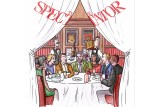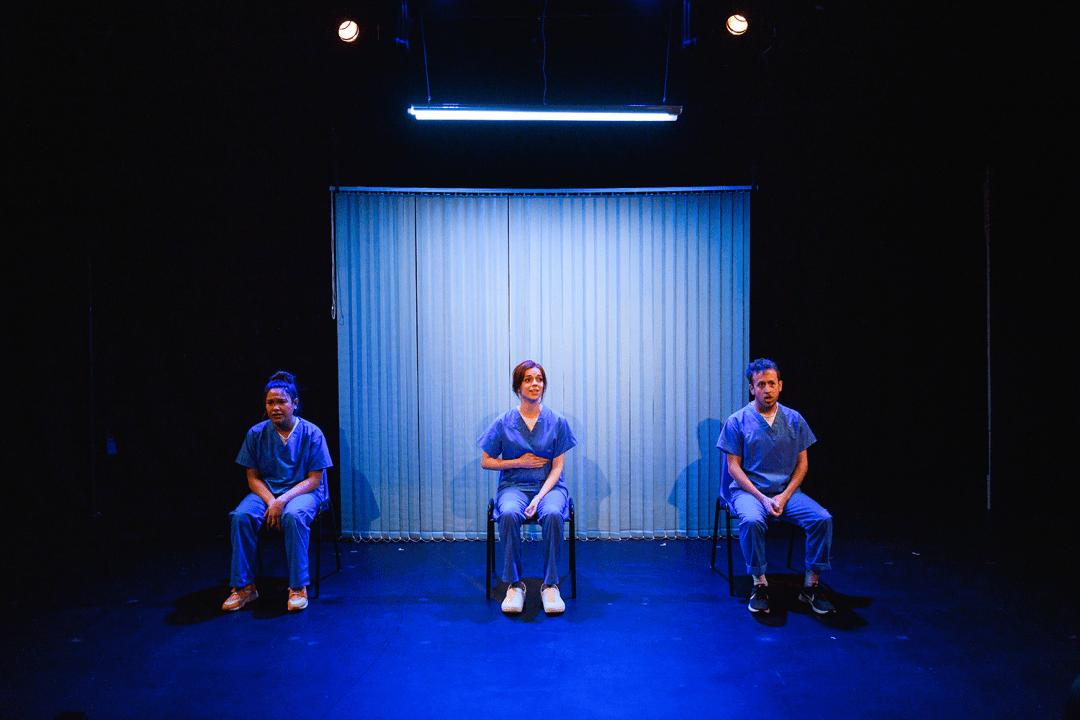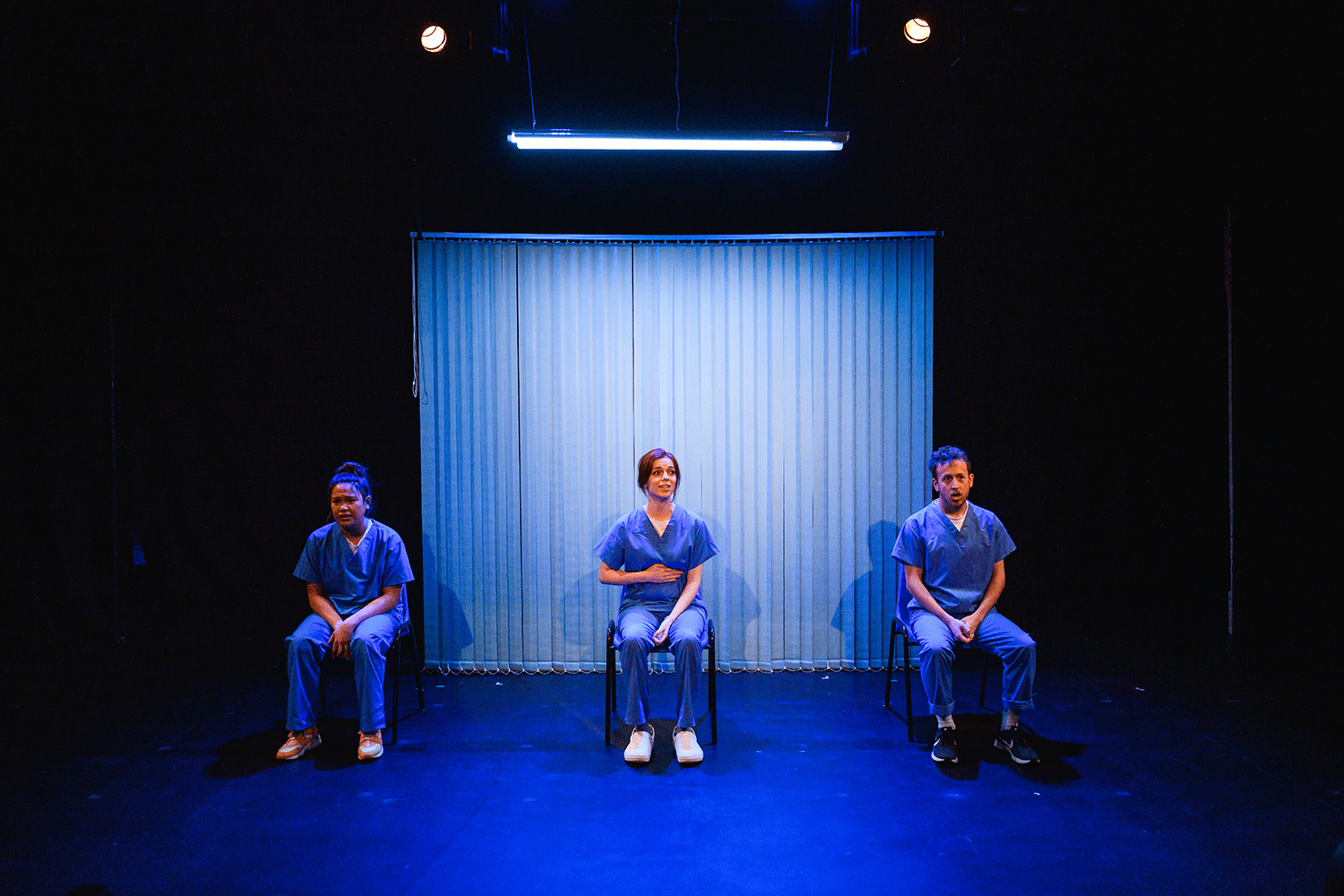
Tending is a work of activism on behalf of the NHS. The script brings together the testimony of 70 nurses in a show spoken by three performers. It’s full of surprises and shocks. All NHS nurses are obliged to annotate their actions as they work. ‘If you haven’t documented it, you haven’t done it,’ they’re told. A nurse estimates that she spends 20 per cent of her time caring for patients and the rest of it chronicling her doings on bits of paper.
There appears to be no feedback mechanism that enables the nurses to help managers find ways to improve the service. A nurse tells the story of a lunatic who barricaded himself inside a lavatory cubicle and slit his throat open. He couldn’t be helped because the locks operated from the inside only. Could this flaw be corrected? No chance, apparently. The system lacks any kind of elasticity.
There are one or two lighter moments. Nurses are sometimes asked to smuggle dogs into wards to say goodbye to their dying owners. A priest with insomnia was entertained by a helpful nurse who played hymns to him all night. The hospital managers know how to protect their interests. Sometimes they prevent staff from speaking to health visitors on official visits. And if an MP is admitted, an empty bed is found immediately, even if the vacancy is provided at the expense of another patient who gets shunted into a corridor.
Some of the revelations are more disturbing. A male worker confesses that he hides behind an emotional force field that enables him to walk through his 12-hour shift, eyes down, head bowed, ignoring every request from patients. He sounds familiar. Many nurses seem close to nervous collapse. In training, they’re told that ‘weeping every day’ is normal during their first six months at work. The bosses urge them to ‘build resilience’ but some nurses resent this advice. And they complain about the range of duties expected of them: serving meals, stirring tea, measuring out doses of medicine, flipping patients over for a bed bath, soaping down mattresses after an explosion of incontinence.
An obvious solution is to replace nurses with robots programmed to record their activities as they work. If the NHS bought 100,000 machines, it could immediately sack all 400,000 nurses. This would have the advantage of removing those who join the profession for the wrong reasons.
The show opens with two characters explaining why they became nurses. One failed to qualify as a doctor, and the other wanted to make it as a schoolteacher but didn’t succeed. Low morale in the profession owes itself to the failings of senior executives who make nurses feel undervalued and exploited. Large parts of the NHS have the toxic atmosphere of a mismanaged hotel where the staff take out their anger on the inmates.
That may explain the strikes, between 2022-24, which are openly celebrated in this show. The nurses claim that ‘everyone supported’ the go-slow. But by ‘everyone’ they mean the cops and firemen who tootled their horns as they sped past in their squad cars and fire trucks. One nurse fondly remembers a ‘sense of togetherness’ during the protest, which seems rather callous. Another recites this phrase of self-justification: ‘People aren’t dying because nurses are striking. Nurses are striking because people are dying.’ And that sums it up. Nurses themselves admit the causal link between the withdrawal of care and the danger to life. They put innocent people at risk in order to wangle themselves a better deal. This show does nursing few favours.
If the NHS bought 100,000 machines, it could immediately sack all 400,000 nurses
Southwark Playhouse has a lavish new musical, Midnight Cowboy, directed by Nick Winston. The show never fully escapes the shadow of John Schlesinger’s classic movie, and the best moments are delivered by Tori Allen-Martin as a sultry temptress who dallies with Joe Buck in her luxury apartment. The storyline is heavygoing and it evokes a half-forgotten world of fear and sexual repression. In the 1960s, gay men were a hunted species who used rent boys to snatch brief moments of comfort in porn cinemas or seedy motels.
The casting is awry here. The title role calls for a goofy, handsome bumpkin like Jon Voight, but Paul Jacob French looks far too jaded, urban and street-smart for the role. His dark hair is greased back, matador-style, and he has the swagger of a poker champion or a Wall Street bond-dealer. Max Bowden makes an engaging Ratso, the crippled vagrant who lives in a condemned apartment, but his performance feels too close to Dustin Hoffman’s original. The music by Francis ‘Eg’ White attempts various genres, and some of the tunes – especially the soul numbers – would work just as well in a different show.
This costly production uses a cast of 13 where six might have been enough. It’s an opulent curiosity.









Comments